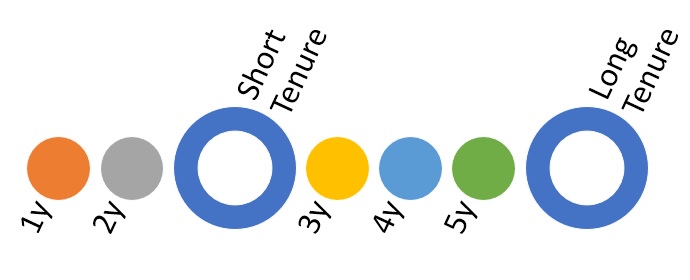Job Tenure - Definition, Importance, Types & Steps
What is Job Tenure?
Job tenure is the measure of the length of time an employee has been employed by his/her current employer. Job tenure of an employee is very important and it is often that the employers consider it as a criteria for hiring new employees. It may be long or short.
Job tenure can be determined by the employee or the employee depending upon who initiates the exit process.
Types of Job Tenure
There are 2 types:
Long Tenure
When an employee has worked for a long time with one particular employer his tenure is referred to as long. In the current market scenario 5 years is considered to be long job tenure. The advantage of long job tenure is that the employee is considered to be loyal which is a very desirable quality. However too long job tenures (more than 5 years) can be a disadvantage as well.
Staying for too long with a particular employer can limit ones perspective and learning. As when an employee stays with an employer for a long time he does the same kind of work and gets comfortable in that position leading to a decrease in his learning and growing. Also the challenge in his job keeps decreasing.
Also a long tenure may be a result of the inability of the employee to get promoted. This may give the new employer a perception that the employee does not have required skills and may result in the employee not getting hired.
Short Tenure
When an employee has worked for a very short time with one particular employer his tenure is referred to as short. In the current market scenario tenure of less than 2 years is considered to be short. While people with short tenure learn more and have a diverse experience working with different employers they may be perceived to be disloyal and a recruiter may have a perception that is that employee has left jobs at such short spans then he/she may leave that company as well.
The employer may also perceive that the employee is in a bad situation and cannot adapt to his/her current place of employment and hence he is looking for a change of job to improve his/her current situation.

Importance of Job Tenure
Job tenure is sometimes linked to quality of the employee. Longer job tenures tend to highlight stability and focus of an individual and vice versa. It may not be true all the time but Job tenure gives a definite insight into an employee.
Longer job tenure helps an individual to acquire expertise in his or her field. In long run with a given company, an employee works in various roles and capacities in a given domain.
It helps in overall development. Shorter Job tenures do no necessarily mean that the employee is not expert sometimes it may also mean that the employee has a skill which is in high demand. Therefore job tenure is quite important when it comes to giving an insight.
Reasons for variations in Job Tenure
There can be multiple reasons for short as well as long tenures. Long tenures might be desirable in certain cases but not in other. but shorter tenures are not desirable for company perspective. Reasons for shorter job tenure can be:
1. Lower Compensation & Benefits
2. Low Job Satisfaction in the role
3. Mismatch in Skill level and qualifications
4. Social Reasons like travel time, family issues etc.
5. Environmental reasons like climate, or city
The companies need to work on the ability to increase job tenures. This way they can retain the talent and improve overall environment in the company.
Steps taken by Companies to increase Job Tenure
Companies can also work on the ability to increase job tenure for the employees. Organizations can :
1. Offer market relevant compensation to the employees
2. introduce Re-skilling programs in the company
3. Have timely rewards and recognition system
4. Offer flexible timings, work from home, Sabbatical leaves etc.
Hence, this concludes the definition of Job Tenure along with its overview.
This article has been researched & authored by the Business Concepts Team. It has been reviewed & published by the MBA Skool Team. The content on MBA Skool has been created for educational & academic purpose only.
Browse the definition and meaning of more similar terms. The Management Dictionary covers over 1800 business concepts from 5 categories.
Continue Reading:
What is MBA Skool?About Us
MBA Skool is a Knowledge Resource for Management Students, Aspirants & Professionals.
Business Courses
Quizzes & Skills
Quizzes test your expertise in business and Skill tests evaluate your management traits
Related Content
All Business Sections
Write for Us